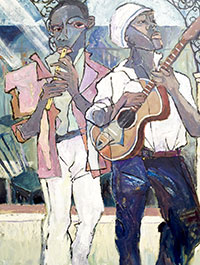
If you view the paintings of Somerville artist Iku Oseki you may find them talking to you. And indeed, you are not losing it. But her work has a strong sense of narrative – a storyline, one might say. I caught up with the artist before she was off to south of the border – Mexico to be exact.
Doug Holder: How has Somerville been for you as a working artist?
Iku Oseki: I have been here since the year the Red Line opened up farther from Harvard Sq. My husband and I moved to Porter Sq. right at the time of the station opening, and I was thrilled! The whole place changed dramatically after that. The convenience, the youthful energy with lots of college students, and the artists community here all contribute to my creativity.
DH: You were born in Japan. But you have a great interest in Mexico and its culture. What whet your appetite for this country and its people?
IO: In the early 90’s, we discovered a small (now big!) town in the central highland called San Miguel de Allende which was known for Institute de Allende, an art school with tremendous offerings of art classes. There is another art institution called Bellas Artes with art, music, and dance galore. Both of us being artists, immediately we fell in love with this place and kept coming back almost every summer with our daughter, who could participate in children’s art and crafts camps. As the town grew, and now has been known as one of the best retiring communities for foreigners, we’ve made many friends, expats and Mexicans, and have continued to visit and enjoy the culture, arts (now they host a international chamber music festival and independent film festival during each summer), food, and the relaxed lifestyle.
DH: You describe your paintings as abstracts with narratives. Is it hard to combine the two?
IO: Not at all! We artists know that simple (not mixed media) paintings consist of brush marks (or applied paint with some kind of tools). Period! I create my brush marks in pretty free-forming, unconscious-driven manners, letting accidental happenings thrive all the time. Yet, I always have a goal of telling some story, and my paintings to be “talkative.”
DH: Vivid color plays a big role in your work. Explain.
IO: I am very particular about color. One of the main lessons I got in the art school days was about color, and I learned to use mainly two opposite colors in the color wheel. My favorite combo is yellow ochre and purple. I do paint a lot in Mexico, and its color has affected me very much. But I also consciously think of the color theme when I paint about different countries, for example. I was in Croatia in 2018, and that country has its own color. We were mainly in the coastal area, and the color of the Adriatic Sea was dominant. But I also picked navy blue for Croatia because its lean toward conservatism and slight “heaviness” from the effect of the war still felt there.
DH: In your Covid 19 series of paintings you have some work that portrays city scenes. It seems that you are viewing them from a distorted lens, something is askew. I assume that this is a metaphor for a world out of whack.
IO: Of course! Also, as you’ve noticed, I like painting people. But, Covid forced me not to paint people, but empty landscapes (I usually paint landscapes with people in the normal time) and nature.
DH: Reading about your process, I found many parallels between yours and my process as a poet. Have you ever thought about the intersection of poetry and art?
IO: Definitely! As I said before, I’d like my paintings to be “talkative,” and it means that I want them to speak to you, the viewer, to have a chat, or a serious conversation. Going back to the previous question, a poem is just an arrangement of words in the same manner a painting is a bunch of brush marks, both in a sense “abstract.” Yet, when it is done consciously with specific themes or goals, with careful emphasis here and there, it becomes descriptive of something.
DH: Did you formally study art?
IO: Yes, I went to Mass Art. I loved that school! I was there for four years in the 80’s, not really aiming for a degree since I already had a BA. I focused on painting and printmaking. But I also studied graphic design. In Mexico, I learned to do ceramics.
DH: Why should we view and purchase your work?
IO: Phew! Nobody ever has asked me that question so bluntly! You buy art because you like it so much that you feel you cannot part from it. You have to feel that you have to live with it. I hope that is how people would purchase my work.
In terms of viewing, we artists see how people come to our shows and just zip through quickly when the work doesn’t get you involved right away. There is nothing you can do about that. We hope that once in a while someone notices the “chatter,” the “Hey! Come talk to me!” and stops and listens. Also, we are lucky to be surrounded by original paintings in our house, and it is absolutely different to have an original painting from having a print or a copy. It is expensive to own an original. But it is well worth it, and my paintings would keep you company like old friends.
For more information go to: https://www.ikuoseki.com/home
















Reader Comments